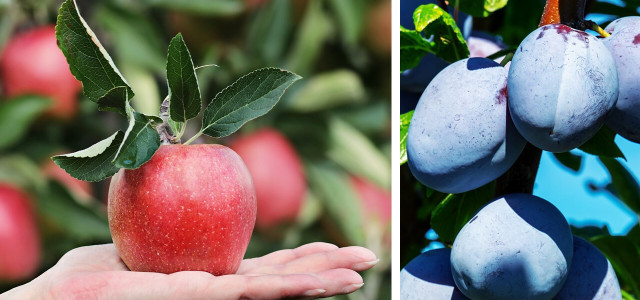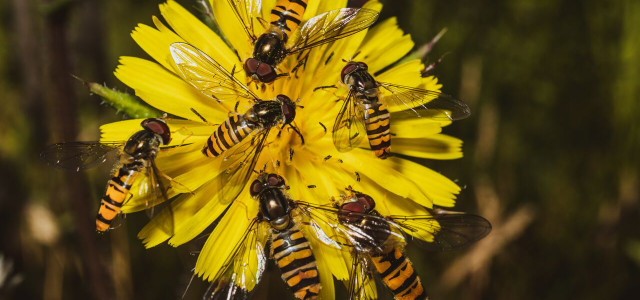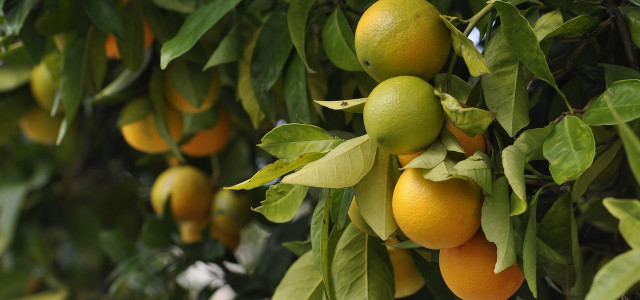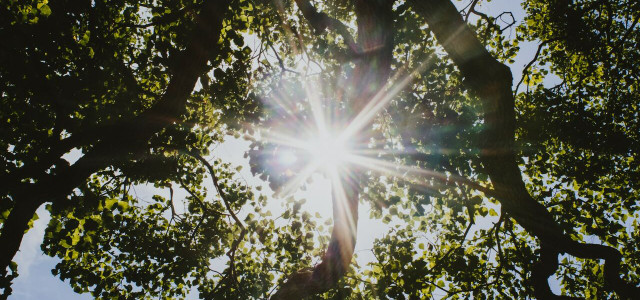The best fertilizers for fruit trees give them exactly what they need. Not all trees require the same nutrients, so we’ll cover what fertilizers work best for specific trees.
A fertilizer is a substance used to supply nutrients to plants. Many types of fertilizers can be used to feed plants, each having a different effect on the plant. The best fertilizer for fruit trees will focus on a specific aspect that the tree needs at a given time or for a specific type of tree.
Fruit trees need different nutrients to perform various functions throughout their lives, such as root development, flowering and fruiting. You should also know how to prune fruit trees for maximum growth and yield.
Here we’ll discuss what fertilizers can be used for the different stages in a tree’s life, those for specific types of trees and why each type of fertilizer works best.
For more information on fertilizers and natural fertilizer alternatives, read:
- How to Fertilize Strawberry Plants Naturally
- Fertilizer for Basil & Tips for Healthy Herb Growth
- Easy Lemon Tree Fertilizer
- How to Use Eggshells as Fertilizer for Your Garden Plants
- Homemade Plant Food for Wilted Plants
Types of Fertilizers
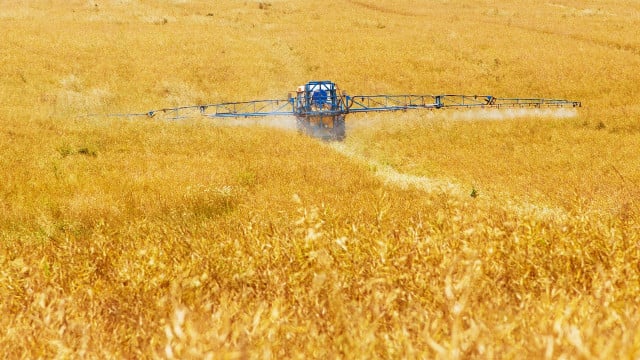
There are two main types of fertilizers: organic and synthetic. Each one can be used to provide a specific type of nutrient, namely phosphorus, nitrogen, and potassium.
Organic fertilizers are naturally produced and can be plant or animal-based, whereas synthetic fertilizers are man-made. The benefits of organic fertilizers are that they help to improve the soil and keep it healthy. The downside is that they can be more expensive to use. Organic fertilizers include manure, compost, natural minerals, and animal waste.
Synthetic fertilizers include manufactured nutrients, such as urea, ammonium nitrate, ammonium phosphate, and potassium chloride. These fertilizers are generally more affordable than organic fertilizers, but there is a risk of overuse with synthetic fertilizers which could damage the soil.
We’ll focus on store-bought and organic fertilizers we’ll also cover how you can use natural nutrient sources to grow your fruit trees.
Best Fertilizers for Young Fruit Trees
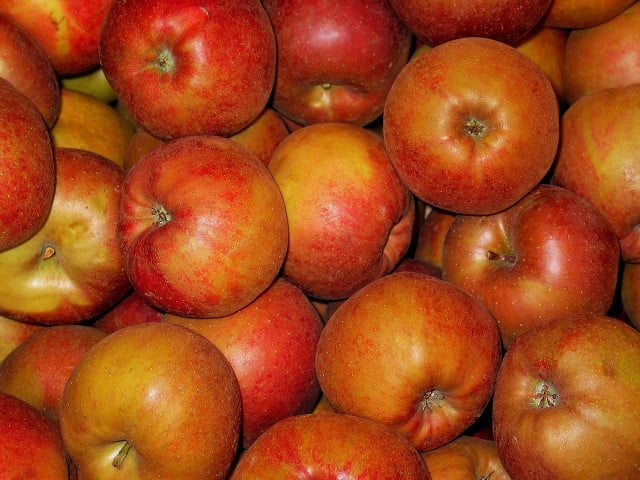


In general, the best fertilizer for fruit trees will contain a mixture of nutrients. However, younger trees, particularly culinary pear and apple varieties, such as Bramley, Granny Smith, and D’Anjou, need nitrogen-dense fertilizers.
Nitrogen plays a key role in supporting plant growth which is why it is best for young plants. As a plant macronutrient, it aids in helping plants to capture sunlight and, in turn, store energy. This energy becomes a driving factor in optimizing fruit yield.
Down to Earth’s Organic Alfalfa Meal Fertilizer (available on Amazon**) is one of the best fertilizers for fruit trees. Alfalfa is a natural source of nitrogen that comes from species of plant in the legume family known as Alfalfa. To create an Alfalfa meal, the plant is dried out and ground into a fine powder. The US-based company supplies the alfalfa meal in granular form that you can dissolve in water to feed your plants.
You can also try making your own nitrogen fertilizer using a combination of natural nitrogen sources, such as coffee grounds, grass clippings, and dried leaves. You simply spread the grounds on top of the soil surrounding the tree, then cover it with leaves, grass, or compost.
You can calculate how much nitrogen your fruit tree needs based on its age or by measuring its thickness. Fruit trees need 0.1 pounds (1.6oz) of nitrogen per year of age or per inch of trunk diameter. For instance, a 5-year-old tree or one with a 5-inch diameter trunk would need 0.5 pounds of fertilizer. Please note you should not use your store-bought nitrogen fertilizer on a tree under 1 year old.
Best Fertilizers for Established Fruit Trees
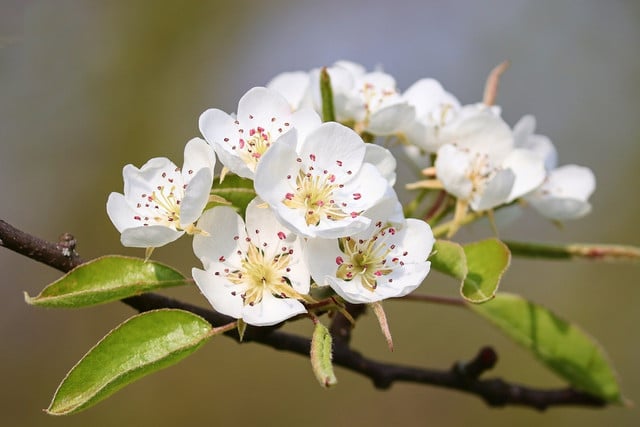


Another key macronutrient for fruit trees and plants is potassium. In plants, potassium plays various roles in both growth and reproduction. It helps to regulate the flow of water within them and facilitates protein production. Potassium is the best fertilizer for fruit trees that are established (3+ years) because it assists in bud and fruit development.
Down to Earth has another good option available, their Organic Langbeinite Fertilizer (available on Amazon**) is suitable for established trees. Langbeinite is a unique source of plant nutrition. It is a type of mineral that can only be found in certain places, and it happens to be a natural source of potassium, magnesium, and sulfur. Of course, the potassium is the most concentrated in this blend, but it is treated so you can add it directly to the soil without damaging it.
If you’re looking for sources of potassium that you can find at home, the most common would be wood ash and compost fed with banana peel.
Best Fertilizers for Citrus Fruit Trees
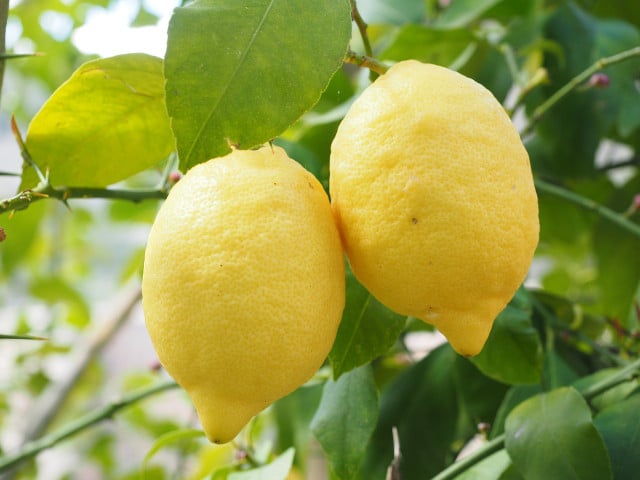


Unlike the stone fruit trees such as apple and pear, which generally come from the Rosaceae family, lemon, orange, lime, and grapefruit trees come from the Rutaceae family. Since citrus trees are a different species, the best fertilizer for fruit trees like these differs from other species.
Citrus trees require a high amount of phosphorous to grow well. It helps them to develop their root system and is essential for their flowers to bloom. Without it, even if your fruit grows, you may notice they will appear misshapen and sometimes even empty under the peel. In fact, it’s been shown that citrus plants yield up to 32.6 percent more when phosphorous is applied.
Jobe’s Organic Fruit and Citrus Fertilizer (available on Amazon**) is the best fertilizer for citrus fruit trees. This is a great choice if you have potted plants because it supplies little spikes that you simply stick into the soil. Then it will slowly release a blend of nutrients specifically designed for citrus species. It’s made from biodegradable and natural sources to support the growth of your tree.
To create your own natural sources of phosphorous for your fruit trees, again composting will be vital. In particular, you can add mushrooms, eggshells, and banana peel to build the phosphorous level of your compost heap. You can also check out our guide for lemon tree fertilizer.
Tip: Citrus trees are particularly prone to phosphorous deficiency, so you should check your soil regularly to ensure they are getting enough.
Best Fertilizers for Yellowing Leaves
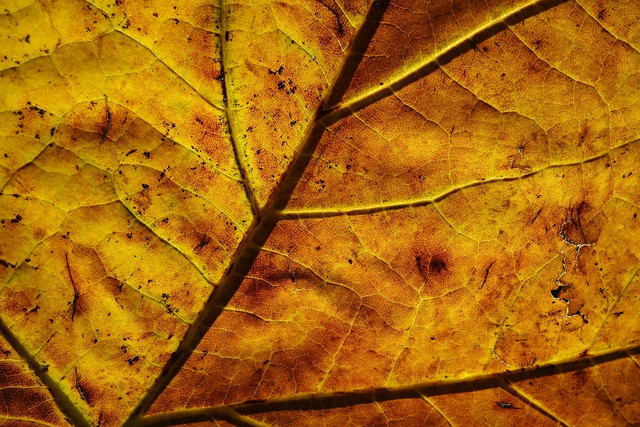


Yellowing leaves are a common problem in fruit trees. When this happens, research shows it usually coincides with stunted tree growth and decreased yield. And the primary (though not sole) cause of this is a magnesium deficiency.
Magnesium plays an important role in helping plant leaves to develop the pigment called chlorophyll, which is what gives them their green coloring and also how they absorb light energy. The most readily available source of magnesium for trees in these conditions is Epsom salt (Magnesium sulfate). Not to be confused with regular salt, Epsom salts are cheap, naturally derived minerals often found in seawater and lake bottoms.
For this, you can buy Epsom salt as is. You’ll find it on Amazon** or at your local pharmacy. To use it, you simply mix 2 tablespoons with a gallon of water in a spray bottle. You can spray it on the leaves of the tree or on the soil.
Tips and Takeaways
Fertilizers are an essential part of the growing process for fruit trees. Just like humans, plants need food to develop and produce new life. Above, we’ve covered the various best fertilizers for fruit trees as they progress through different life stages. Though a general all-purpose fertilizer may also be useful, you should be checking the nutrient levels of your soil to ensure that it is what your plant truly needs.
If you use all-purpose without checking, you may be under or over-feeding your trees in certain nutrients. Whereas, by catering specifically to what your plants need, you can foster a deeper understanding of how they grow and live.
Read more:
- How to Compost Leaves: 3 Ways
- What You Can Compost, What You Can’t — and Why
- 12 Most Stunning Plants That Flower in Winter
Do you like this post?






